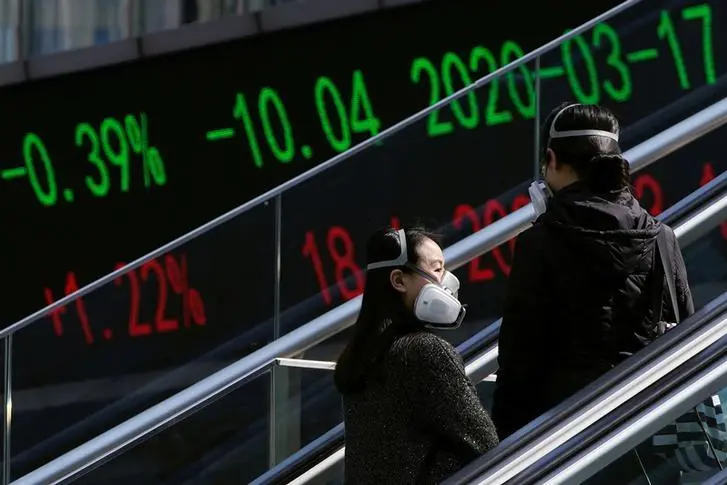PHOTO
SINGAPORE - Asian stocks are set to snap a two-week losing streak on Friday after major central banks kick-started their rate easing cycles this week, adding to expectations the U.S. Federal Reserve could soon follow suit.
The European Central Bank (ECB) delivered a well-telegraphed rate cut on Thursday, a day after the Bank of Canada became the first G7 nation to trim its key policy rate.
The two join Sweden's Riksbank and the Swiss National Bank in beginning their respective monetary easing cycles, breathing new life into the global risk rally and as bets grow that the Fed could also cut rates in September.
"You've got two of the G7 cutting rates ... it certainly opens the door further to the Fed," said Tony Sycamore, a market analyst at IG. "We're not in the home straight, but we've certainly rounded the corner.
MSCI's broadest index of Asia-Pacific shares outside Japan rose 0.2% and was on track to end the week nearly 3% higher, though some of its gains were capped by a selloff in Chinese stocks.
Europe looked set to extend the positive momentum, with EUROSTOXX 50 futures advancing 0.02% while FTSE futures gained 0.17%. S&P 500 futures were up 0.1%, with Nasdaq futures adding 0.16%.
Market moves were largely subdued as traders stayed on guard ahead of Friday's U.S. nonfarm payrolls report, where expectations are for the world's largest economy to have added 185,000 jobs last month.
"If we did get a little softer data tonight ... We could see 10-year Treasury yields pushing down towards the 4% level," said Rob Carnell, ING's regional head of research for Asia-Pacific.
"Equities, in all likelihood, would rally strongly on that, and that would reflect across the region. You'll likely see the dollar losing a little bit of strength from that."
The benchmark 10-year U.S. Treasury yield was last firm at 4.3005%, while the two-year yield rose slightly to 4.7421%, after having clocked six straight sessions of declines on Thursday.
The decline in yields has come on the back of renewed expectations of imminent Fed rate cuts, following a slew of data this week which pointed to an easing of labour market conditions in the United States.
Markets are now pricing in roughly 50 basis points of easing from the Fed this year.
Elsewhere, the dollar languished near an eight-week low against a basket of currencies, and was headed for a weekly loss of more than 0.5%.
The euro rose 0.05% to $1.0895, extending its slight gain from the previous session as the ECB raised its inflation forecasts and kept investors in the dark over how soon subsequent rate cuts could come.
"The ECB nudged up its projections for core and headline inflation ... This implies that policymakers might feel slightly less inclined to cut interest rates further," said Andrew Kenningham, chief Europe economist at Capital Economics. "Changes to the policy statement were also slightly hawkish."
RISING TENSIONS
China, however, was left out of the global risk rally on Friday, after a group of Republican lawmakers said that Chinese battery companies with ties to Ford and Volkswagen should be banned from shipping goods to the U.S., according to a Wall Street Journal report.
That sent Chinese blue chips falling 0.8%, while Hong Kong's Hang Seng Tech index slid more than 1.6%.
The Hang Seng Index declined 0.5%.
The negative headlines overshadowed Friday's data which showed China's exports grew more quickly and for a second month in May, offering some relief to the economy as it battles to mount a durable recovery.
Japan's Nikkei similarly fell 0.26%, as traders also stayed cautious ahead of the Bank of Japan's monetary policy meeting next week, where the central bank is expected to embark on a tapering of its bond buying scheme.
Against the dollar, the yen steadied at 155.66.
"Based on various reports on the BOJ, we anticipate further policy guidance on its quantitative easing programme from as early as the June BOJ meeting, with a greater focus on the tapering of bond purchases compared to balance sheet contraction," said Carl Ang, fixed income research analyst at MFS Investment Management.
Japanese household spending rose for the first time in 14 months in April from a year earlier, data showed on Friday, although the tepid growth showed consumers remained reluctant to loosen their purse strings in the face of higher prices.
In commodities, oil prices rose, with Brent crude futures up 0.25% at $80.07 a barrel while U.S. West Texas Intermediate crude futures gained 0.29% to $75.77 per barrel.
Spot gold edged 0.3% higher to $2,382.55 an ounce.
(Editing by Jacqueline Wong)




















